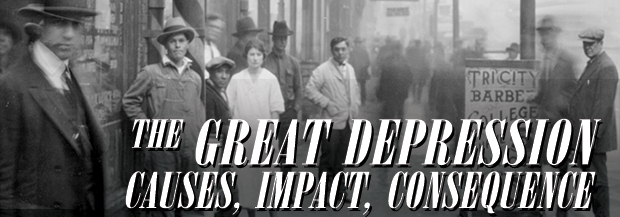The 1920s and '30s marked Kansas City's transformation from a rough "cowtown" into a vibrant, modern city – despite such hindrances as political corruption, the Great Depression, and strained relations among the races and sexes. The period is spotlighted during the Wide Open Town Symposium at the Library on April 1-2. Pulitzer Prize-winning historian David M. Kennedy, a professor emeritus at Stanford University, provides a national context for the scholar-led symposium, examining the Depression and other transformative milestones in America during that era. Liquor during the reception will be provided by Tom's Town Distilling Co.
The Wide Open Town Symposium is organized by the Kansas City Public Library, the Center for Midwestern Studies and the University of Missouri-Kansas City History Department. It is co-sponsored by the Freedom’s Frontier National Heritage Area, UMKC Bernardin Haskell Lectures Fund, UMKC Office of Research Services, and UMKC High School/College Partnership Kennedy’s keynote address is part of the Organization of American Historians’ Distinguished Lectureship Program.
The Wide Open Town Symposium, featuring presentations from professional historians and a keynote lecture at the Kansas City Public Library's Plaza Branch, explores the 1920s and '30s in Kansas City history. It is free and open to the general public.
The symposium also anticipates a pair of projects based in part on this scholarship. A book of collected essays will be published by the University Press of Kansas at a future date. Additionally, a new website will form the next edition of the Library’s effort to create a digital encyclopedia of Kansas City’s history. The first edition, CivilWarOnTheWesternBorder.org, explored the Missouri-Kansas border war with fresh scholarship, lesson plans for educators, and thousands of digitized original documents, garnering multiple awards in the fields of public and digital history. Keep an eye out for a future book and website on Kansas City’s Pendergast Era.This dynamic period marked Kansas City's transformation from a rough "cowtown" on the Great Plains into a modern city that boasted an expanding population, a developing urban core, and a cultural fluorescence best characterized by its vibrant nightlife and jazz scene. Kansas City established a national reputation in this period, prompting many modern observers to consider it the city’s "golden age." Underneath the gilded veneer, however, the era was marred by the political corruption of the Pendergast Machine, by the Great Depression, and by strained relations among the races and sexes. Even with a decidedly mixed legacy, this period largely defined Kansas City’s reputation for much of the 20th century.
The Wide Open Town Symposium is organized by the Kansas City Public Library, the Center for Midwestern Studies and the History Department at the University of Missouri-Kansas City. It is co-sponsored by the Freedom's Frontier National Heritage Area, the Missouri Humanities Council, the UMKC Bernardin Haskell Lectures Fund, the UMKC Office of Research Services, the UMKC High School/College Partnership and Tom's Town Distilling Co. Kennedy’s keynote address is part of the Organization of American Historians’ Distinguished Lectureship Program.
